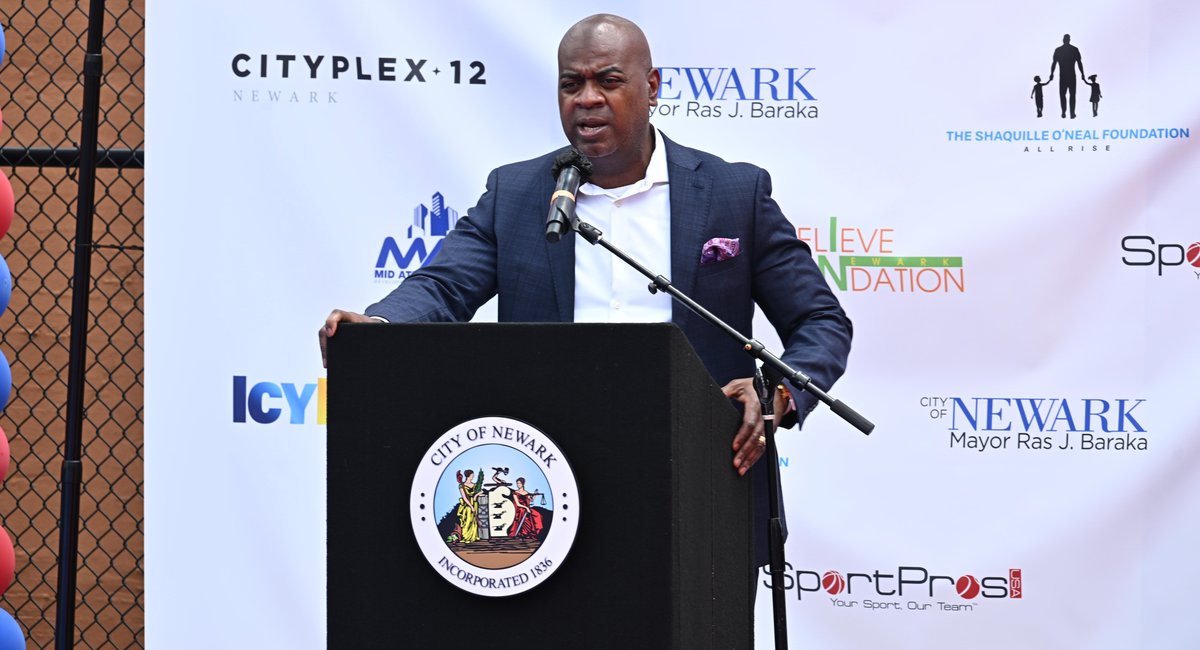Federal prosecutors are alleging that two contractors for a company that was supposed to replace lead pipes in the city of Newark did not fully do so, but defrauded the city and billed them for the job.
Newark Mayor Ras Baraka, who is also running for governor of New Jersey, joined WNYC’s All Things Considered this week to discuss the case and the state of the city’s water.
This interview has been lightly edited for clarity.
Sean Carslon: Mayor Baraka, thanks for coming on. Before we get into the details here, can you assure Newark residents that their pipes are safe?
Baraka: Absolutely They’ve been safe while this was going on. In fact, the last test that we had came out at zero parts per billion for lead. Which means that we have less lead or no lead in our water. Bottled water is allowed to have five parts per billion of lead in the water. We have zero in Newark.
Tell us about this company JAS Group Enterprise. Who are they and what were they contracted to do?
Well, I really don’t know who they are specifically … they went through a public bidding process like everybody else. They were a subcontractor on some of the projects and a prime on the other. You know, unfortunately, they made a decision to do what they did, uh, very deliberate and intentional defrauding of the city and hurting the trust of thousands of residents in our city.
So, you know, the justice department did the right thing and indicted them. That’s what needed to happen.
Was there work citywide or was it isolated to a certain neighborhood or a corner of the city?
No, it was multiple parts of the city: 1,500 land service lines out of 23, 000 they were responsible for.
So how was the scheme uncovered and when did the city find out about it?
The Department of Justice, obviously. I don’t know how they found out or what their mechanism or timeline was. When they reported it to us, they told us two sites, three sites that they possibly thought were involved. We went there. I believe we found something there and we changed it immediately.
Then we began to do our own investigation with the help of the New Jersey Department of Environmental Protection, who did a Yeoman’s job in helping us go through thousands of documents, look at pictures, files, go out to places we thought were suspicious and begin searching. We didn’t find a whole lot, but we found some stuff and we changed it.
What are the penalties here?
Well, I don’t I don’t know what the federal penalty would be. The Department of Justice would have to determine that. I know that all these contractors take out bonds, insurance bonds, and so the city has to be reimbursed for the work that they said they did and didn’t do and for the work that we did.
Was anyone ever at risk because of of what wasn’t done
No I mean, we have orthophosphate in the water. We put it in, in 2019, which was the reason, we had the problem in the first place. Our own sodium silicate stopped working. So we had to replace that with orthophosphate. We did that in 2019. We’ve been in compliance since 2019 to the present. I mean, that’s what the the NJ DEP and all of our testing has borne out.
And the last test, as I told you earlier, came up with zero parts per billion. So the orthophosphate works, right? So even if we remove the lead service line, we still have to protect people who have old lead fixtures in their house. They might have sinks that have lead fixtures. They may have stuff under the sink with lead fixtures. And so the orthophosphate stops the lead from leaching into the water. And so it was working then and it’s working now.
Newark’s lead service replacement line program was widely seen as a success. It was hailed as a model for similar undertakings around the country. You heard about it on national news a lot. Do you think that the fraud here tarnishes the success of that program?
No, I think people attempt to do that, but we changed 23,000 lead service lines in less than three years. I mean, there are cities that have less than that, that are still struggling with this issue, to [address] this problem that they didn’t create, but it’s there.
So, I mean, how we did it, the public works. A project that we created and the opportunities that came as a result of it, and the speed that it took us to get this done. I think it’s still a model. It doesn’t mean that, you know, there won’t be people who try to do what these guys did. By God’s grace, they got caught and we were able to rectify it very quickly.
